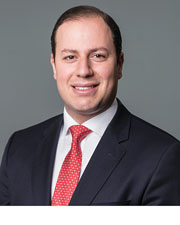Brokerage beyond basics: Betesh of Meridian Capital Group discusses his approach to difficult markets
 New York, NY For some brokers, a rapidly fluctuating market is a source of anxiety. For Morris Betesh, senior managing director of Meridian Capital Group and his team of eight, it’s a source of excitement. And lately, there’s been plenty of it as he and his team are closing an average of 60 deals annually. How do they navigate fluctuations and close deals under today’s challenging conditions? We asked him to give us a few insights:
New York, NY For some brokers, a rapidly fluctuating market is a source of anxiety. For Morris Betesh, senior managing director of Meridian Capital Group and his team of eight, it’s a source of excitement. And lately, there’s been plenty of it as he and his team are closing an average of 60 deals annually. How do they navigate fluctuations and close deals under today’s challenging conditions? We asked him to give us a few insights:
Thriving on the Tough
Plain Jane deals? Easy life? Not good fits for Beteshs’ team. “I guess we’re a bit masochistic,” he said. “The more complicated the capital stack, the more excited we are.”
It’s safe to assume, then, that the team is pretty ecstatic these days. In the works are several construction financings that require senior debt, mezzanine debt, and preferred equity. Such deals involve marketing to senior lenders and mezzanine lenders, going through the due diligence process for both, and then obtaining approvals from and negotiating loan documents with both.
And that’s not all. The next step is to negotiate inter-creditor agreements or recognition agreements between the senior lender and the mezzanine/preferred-equity lender, as well as determining the optimal funding structure. “It’s like closing three loans at once,” Betesh said.

The team’s hard work has paid off, with many construction and pre-completion take-out loans closed during 2019–a year when many industry insiders expected a slowdown in this sector. Two recent transactions, closed over the past 45 days, include 510 Driggs Ave. and 18 Spencer St., both in the Williamsburg neighborhood of Brooklyn. 510 Driggs was a $72 million construction loan, which included preferred equity in the capital stack, for a planned 122,000 s/f condominium building with 30,000 s/f of commercial space and 111 parking spaces. 18 Spencer St. was a recapitalization of a partially completed ground-up spec office building. The $17 million loan is funding the completion of construction and lease up of a 59,000 s/f office property with 81 parking spaces.
Even the new multifamily rent regulations in New York haven’t fazed Betesh and his team. On the contrary, they’re turning the obstacle into an opportunity by working with owners to close long-term, fixed-rate, interest-only debt on rent regulated properties. As Betesh explains, this gives the owners 10 years to figure out how to address the rent regulations. “The regulations were a big shock to the industry,” he said, “but anytime there’s dislocation in the market, we view it an impetus for creative problem-solving.” CMBS lenders, among others, are actively closing 10-year loans on New York City multifamily properties with interest-only and other terms that are enabling owners to maximize cash-flow and take time to figure out how to properly react to the changes.
Ongoing Proactivity
Positive developments in the market bring opportunities as well. Betesh points to the large amount of available capital as an example, “We’re constantly reviewing our clients’ portfolios to determine ways we can optimize their financing. The new capital that’s entering the market daily allows us to be especially aggressive in matching our clients’ needs to those of lenders.”
He said, “Our perspective on client relationships is that closing a deal is only the beginning. That means we call clients with ideas before they call us, which is why they’ve come to view us as trusted advisors on all things capital stack related.”
Proactivity extends to lender relationships as well. “We pay close attention to the changing players and moving parts,” Betesh said. “We want to be the first to know when a new debt fund enters the scene. And we want to be the first to establish a relationship with them. Market knowledge is one thing; through relationships you can convert that knowledge into opportunities for your clients.”
The risk adjusted returns on pre-development and development deals has attracted more developers and owners into the lending space, a trend that the team has also capitalized on. “When the lines between debt and equity are blurred, you reach a level of complexity that is natural to us,” Betesh said. “This is especially true of construction financing, which is far more complicated than land or acquisition loans.”
The 37-month loan that Betesh negotiated for the dual-branded Marriott Courtyard and Fairfield Inn at 148-23 Archer Ave. in the Jamaica neighborhood in Queens is an example of where Betesh was able to advise the client to refinance their existing construction loan with a new one at a substantially lower rate due to the fact that the original loan had a high floor rate relative to the current market.
Positive Attitude
If you want to bemoan the challenges of today’s market, don’t expect Betesh to echo your expressions of angst. “Whatever happens, we’ll adjust,” he said. “We’ll find opportunities in a strong market and opportunities in a weak market.
“It’s relatively easy to generate loan volume when investment sales volumes are increasing by 10 to 20 percent a year,” he said. “But over the past few years, while investment sales have lagged, my team’s business has increased by about 50%. As you can see, there’s no reason for us to lose our positive attitude.”
AmTrustRE completes $211m acquisition of 260 Madison Ave.


Lasting effects of eminent domain on commercial development - by Sebastian Jablonski

AI comes to public relations, but be cautious, experts say - by Harry Zlokower

Behind the post: Why reels, stories, and shorts work for CRE (and how to use them) - by Kimberly Zar Bloorian









.jpg)

.gif)